- Home
- Jasper Fforde
Early Riser Page 5
Early Riser Read online
Page 5
Almost everyone had heard of Toccata. She was rumoured to have a policy of rarely taking wrongdoers alive and Deputy Consuls died under her command at eight times the national average. There was also a rumour she’d seen the Gronk – up in the fire valleys where the snow never settles and the air is full of sulphurous fumes, as though the devil herself had made landfall.
‘I heard she ate a nightwalker in order to survive a particularly bleak Winter,’ I said.
‘Two, I heard,’ said Pryce, ‘and that she now has a taste for it.’
‘C’mon,’ I said, expecting a leg-pull.
But he seemed deadly serious.
‘There are times when survival dictates extreme measures. Some say the Bard wrote Sir John Falstaff into so many of his plays for that express purpose – someone unseasonably portly for the Winter Players to feast upon if things got bad.’
‘Really?’ I asked.
‘Who knows? But Winter Cutlets should always be a consideration, when the hunger pangs hit, pantry is empty and hibernation isn’t an option. Oh, and speaking of Toccata, don’t mention her to the Chief. They had a thing going a few years back. He’s still a little raw over it.’
‘What happened?’
‘He fell in love.’
‘Really? He doesn’t look the kind.’
‘Oh, he’s the kind all right. But then she split on him and, well, as I say, he’s still a little raw.’
Coincidentally, Toccata had recently called the office, looking to speak to Logan. I told Pryce about it and he raised an eyebrow.
‘Personal?’
‘Professional. Something weird going on in Sector Twelve.’
‘So what’s new? There’s always something weird going on in Sector Twelve.’
There were few leads regarding who killed Klaar. A recent snowfall had wiped all the tracks, but Logan sent a couple of Consuls to speak to the friendlies to find out which gang had the bigger grudge.
‘What happens now?’ I asked as Logan and I drove back to the Consulate.
‘We wait,’ said the Chief. ‘Once the hunger sets in, someone will come pleading for food in exchange for information. Nothing like a good roast beef dinner with gravy and Yorkshire pud followed by trifle to get people talking. “Fill the tum, loosen the tongue”, as we say.’
* * *
* * *
The next two days were dominated by heavy snowstorms so I practised blind driving with Logan using the H4S radar set in the Sno-Trac. It was a little tricky to begin with, but I’d done several hours on the simulator, so didn’t make a complete pig’s ear of it.
‘Want some advice?’ asked Logan as I swerved my way around Cardiff navigating only by the radar returns on the H4S screen.
‘Is it about washing?’
‘No,’ he said, ‘it’s this: plans are all well and good in the Summer, but in the Winter it’s wiser to simply have an objective.’
‘I thought we were meant to make a plan and stick to it?’
‘Events move fast,’ he said, ‘and you need on-the-hoof flexibility to ensure the plan doesn’t get in the way of the goal.’
It actually seemed like quite good advice.
‘Thank you,’ I said.
‘You’re welcome,’ he replied, ‘and less starch on my shirts – it’s like wearing cardboard.’
* * *
* * *
Toccata called again once we were back in the office and Logan spoke to her for almost an hour in the privacy of his office. From what I could understand, Toccata wanted Logan to come over to help on a case, but Consuls didn’t go off-sector this close to the Winter – protocol, apparently. There was also, it seemed, something about a woman named Aurora, who a quick piece of research revealed was HiberTech’s Head of Security in Sector Twelve. From what I overheard of Logan and Toccata’s conversation, she was hated by both of them. I asked Vice-Consul Pryce about Aurora and he warned me to ‘stay away from those three – nothing but trouble’.
* * *
* * *
The day after that we helped the MediTechs round up all the Edwards and Janes.
‘I never like this part of the job,’ said Logan. In fact, no one enjoyed it as far as I could see – except the MediTechs themselves, who were finally going to do in the Winter what they had been preparing for all Summer. The redeployed, their limited usefulness over and physiologically unable to hibernate, were due to be parted out as soon as the recipients were in full hibernation. If nightwalkers were the unintended consequence of Morphenox, the free menial workers and transplantation possibilities were the unintended consequences of the unintended consequence. Screening had been carried out all Summer, and each Edward or Jane had the names of their intended recipients cold-branded on their various parts. Leg, face, fingers, organs – there wasn’t much that couldn’t be replaced. Something to do with the hibernatory state being especially conducive to non-rejection.*
‘Never enough, eh?’ said one of the MediTechs, consulting a clipboard and the thirty or so individuals we had collected from their places of work. They stood there blankly, swaying gently from side to side until they were loaded into a mammoth-truck and carted away.
‘Doesn’t seem right somehow,’ I said, probably too loudly. Consul Thomas heard me.
‘You’ll not complain once you lose something to frost and want it replaced,’ she said, patting her arm, which I noted was a great deal paler than the rest of her, ‘and you will, eventually. You’re not part of the Winter until the Winter’s taken a part of you.’
* * *
* * *
On the fourth day before Slumberdown the local police conducted the seasonal handover of Jurisdiction, a ceremony that included the mayor, the Chief of Police and a large symbolic snowflake made of gingerbread and marzipan. I wasn’t there; someone had to answer the phones in the office and finish the ironing.
* * *
* * *
Two days after that, Beryl Cook nearly had a meltdown. And this is when Mrs Tiffen comes back into the story.
Oliver Tiffen goes hot
‘ . . . HotPots were replaced every thirty years whether they needed it or not, always during the early Summer. Exclusion zones were implemented and the work carried out by a team chosen by lottery from the over-sixty age group. Given that the average life expectancy was sixty-four, the effect of long-term radiation poisoning would be minimal. High risk emergency shutdown had their own workforce: The High Octanes . . . ’
– from Seventeen Winters, by Winter Consul Lance Jones
We drove across the city at daybreak, the tracks of the Sno-Trac clean and sharp over a fresh fall of snow, the sky slate-grey. Only the thin trails of vapour rising from the numerous Dormitoria gave any clue that we were in a city of almost half a million people.
Despite it being two days before Winter officially began, most people had already hunkered down, and anyone who wasn’t yet asleep would be going through their pre-hibernatory nesting rituals. Yoga and Gregorian chants were always popular, with yoyo, tango, humming, bezique and watercolouring going in and out of favour as the vagaries of fashion saw fit. But for most people it was a simple slowing of activity, purposefully avoiding anything exciting. This was a winding down, a relaxing of mind and spirit.
To assist initial descent and a free return in case of an accidental awakening, the networks ran looped repeats of Bonanza throughout the Winter. Residents with Random Waking Syndrome kept a TV switched on at the foot of their bed, sound turned down low, the picture dimmed.
‘It’s only dull by endless repetition,’ Logan had explained earlier, while we discussed strategies to ease anomalous wakers back to sleep, ‘and the close familiarity of the characters and situations make for an often transcendental drifting of the mind.’
No one quite knew why Bonanza had become the TV series of choice for the Winter, but the more it was watched, the mo
re suited to easement it became. If the machinations of the Cartwright family didn’t work, you could always watch reruns of Crossroads or resort to the default entry-level route to welcome catatonia: Ulysses, Moby Dick or War and Peace.
I halted the Sno-Trac outside the Beryl Cook Dormitorium, the largest of twenty-seven Kipshops* on the seafront at Penarth. I made sure the compressed air tank was in the green so I could effect a restart, then stopped the engine and climbed out of the rear door. The recent fall of snow had partially melted in the morning sun then refrozen, and the ground felt like Rice Krispies beneath our boots.
‘We’ve got the control rods fully in and the core temperature is still wavering on the red,’ said the porter in an oddly enthusiastic way, as though a reactor fire would be a welcome diversion from the Winter boredom. He beckoned us in to the small control room just behind the reception and we all stared at the core temperature dial, which was indeed wavering on the danger level.
The heat sources that kept Dormitoria at Low Ideal* throughout the Winter were now Uranium Reactor Piles rather than the sometimes erratic and unreliable ‘GlowPits’ of layered peat, pitchblende, coal and hardwood. By contrast, the uranium/graphite ‘HotPots’ were efficient and generally maintenance free, but could sometimes – very rarely, it was often stressed by Albion Nuclear – be temperamental in a dramatically showy kind of way.
‘I can’t go into the Winter with a potential reactor overheat and auto-shutdown on my hands,’ said the porter. ‘Who’s going to pay for the rehoming if the Beryl goes dark midwinter? Not me.’
I looked down at the floor with, I think, a sense of mild concern.
‘Fully shielded when they converted the GlowPit to a HotPot,’ said Logan, sensing my disquiet. ‘Twelve inches of lead between us and the stack. Of all the reactor-equipped Kipshops in Cardiff, none has failed any higher than a Code Orange, and that was in the Cary Grant.’
‘The control rods jammed,’ said the porter, ‘but failsafes prevailed,’ he added, with an air of disappointment.
We’d called the Duty Officer at Albion Nuclear, who initially suggested that we should wait ‘until it got really bad’ before doing something. After more urgent pressing, he concurred between yawns that someone should go down and have a look and to get back to him ‘if we thought it looked serious’.
Logan asked me to find the nearest technician on the High Octane list but the porter saved me a call.
‘We have Oliver Tiffen on the eighth floor,’ he said. ‘Nice chap. I’ll get him down.’
For emergency scrams,* visual inspections or other potentially fatal situations, there was a list of sprightly reactor-savvy octogenarians for whom a fatal dose of radioactivity would not radically shorten their lives. They were paid handsomely for their services and there was a medal in it somewhere if you were needed, but owing to reasonably robust safety precautions and the low wattage of the piles, most weren’t.
Mr Tiffen appeared in ten minutes, incongruously dressed in tweeds and plus-fours, and surprisingly underage – he looked barely forty-five. True, you could be any age to volunteer, but no matter what, members of the High Octane Group had to be at half-hour readiness at all times. Oliver Tiffen stared at the gauges in the control room and grimaced as the core temperature rose a few more degrees.
‘This looks like fun and games,’ he said, donning gardening gloves, a pair of goggles and a crude telephone headset. He wore a respirator around his neck in an old bag with an oxygen bottle strapped to the front, and carried a Gladstone bag full of spanners that jangled as he walked.
‘Problematical?’ asked Logan as Tiffen stared at the service log, which looked old and mildewy and was covered in coffee stains.
‘If I’m right, we’ve got under twenty minutes before an explosion rips the building apart and scatters burning fissile material for about a thousand yards in every direction.’
‘And if you’re wrong?’ asked Logan.
‘Then it’s a failure of instrumentation or my expertise,’ he said with a grin. ‘You’d all better get clear just in case. Porter? You can stand by to flood the core chamber if I can’t shut down the reactor in time.’
‘It’s that bad?’
‘It’s that bad. Here,’ he added, passing a sealed envelope* to Logan, ‘take this in case everything goes balls-down, would you?’
He then told the porter to stand by, opened the core access door with a key he kept around his neck, and disappeared inside. The door slammed shut and we heard his footsteps hurrying down the spiral staircase, clanging on the steel treads as he went.
‘You should both leave if you want to,’ said the porter, his hand hovering over a large pull-down handle that was marked ‘EMERGENCY CORE FLOOD’.
As a porter he had initially seemed ineffectual and flippant, but now it had come to crunch time, he would do as all porters do – never abandon their sleeping charges and go down with their Dormitorium, if required. I was learning that the Winter had a curious integrity all of its own.
‘We’ll hang around,’ said Logan, confident, I think, that between the porter and Tiffen the issue could be resolved. He didn’t ask me if I would stay, but then as his Novice, I was kind of part of him. After a few minutes we heard Oliver Tiffen’s voice over the crackly loudspeaker, and he explained the problem, which was kind of technical, but involved a loss of water in the safety tank or something, and that everything was ‘cooking up down here’. We then heard ‘oh shit’, a few more choice swear words and then, in a calm and measured tone: ‘flood flood flood’.
The porter didn’t hesitate for an instant, and pulled the lever. There was a rumbling from somewhere deep below that sounded like rushing wet cement, then silence. The temperature gauge dropped suddenly and all the other dials slowly fell to zero.
‘Well,’ said the porter, ‘that’s me out of a job.’
* * *
* * *
The Beryl Cook had two hundred residents, and everyone still awake lent a hand to move them out. The walking awake and the dozing were sent to emergency bedrooms in other Dormitoria, but anyone in the treacly abyss of the Hib was consigned to Honeycomb Sleepshacks still in their beds, as they wouldn’t know the difference until they woke up. The mayor herself actually turned up with a retinue of large and very yawny bureaucrats, who were all eager to downplay the accident, probably because it meant returning to bed quicker and less paperwork.
‘I think we should call this a Level Three “Serious Incident”,’ she said, ‘rather than a Level Four: “An Accident with Local Consequences”. Don’t you?’
‘Didn’t the accident kill Mr Tiffen?’ asked Logan, knowing the difference.
‘Technically-speaking he wasn’t killed by the reactor – he drowned. This is really more to do with the coastguard.’
‘It was under twenty tons of boron slurry,’ Logan pointed out.
‘Agreed,’ replied the mayor. ‘They’ll dig him out in the Spring. His sacrifice will be remembered, and he will be honoured.’
And she then posed on the front steps for a lone photographer who had turned up with a disinterested-looking journalist who asked a series of lacklustre questions. It was two days before Slumberdown. No one shows much enthusiasm about anything in the last week before bedding down.
‘Come with me,’ said Logan once the mayor had departed, yawning, back to City Hall.
All Dormitoria were built to a standardised design, not refined much since initial adoption by Constantine in the fourth century. A circular building, usually capped by a steep conical roof, with twenty or more floors and a central thermal distribution shaft that ran up the centre. The stairs were either embedded in the stout and well-insulated walls, or, as here, wound their way in a spiral fashion up the central void.
Oliver Tiffen’s room was on the eighth floor and Logan used his Omnikey to gain access. The room was dimly lit, and of the standard pizza layout: a
one-eighth slice of the circular floor, with the door at the truncated sharp end. The rest was divided into bathroom, bedroom and living area. Heat and light were valued commodities, but from opposite directions: heat from the central core that ran up through the building, light through triple-glazed slots in the outer wall.
We found Mrs Tiffen in the bedroom, surrounded by packing cases of food. She was well nourished, but utterly vacant – Oliver Tiffen had been harbouring his wife since she turned nightwalker. She clacked her teeth at us, then launched into a lively rendition of ‘Help Yourself’ on the bouzouki.
‘Plays it well, doesn’t she?’ said Logan.
It wasn’t unusual for nightwalkers to display skills dredged up from the tatters of their memory. Most knew a few words and could do a trick of some sort, even as mundane as finding their way to the shops or tuning a wireless. A very few, however, could do quite extraordinary things, like ice-skate and play Canasta. Mrs Tiffen was one of these, or, in the parlance of nightwalkers, ‘Tricksy’. Rumour had it the more advanced redeployed – the Edwards and Janes, for instance – were based on these individuals. More upstairs to rewire, apparently.
‘Your husband just drowned under twenty tons of boron slurry,’ said Logan to Mrs Tiffen, ‘but he fulfilled his duty without fuss or drama. If you could be proud of him, you would be.’
Mrs Tiffen didn’t react and just continued to play the bouzouki.
‘Why go to all this trouble keeping her?’ I asked as we stared at the woman, who seemed healthy enough, if a little pale in her demeanour. ‘And to volunteer yourself so young for High Octane and such a potentially gruesome death?’
In answer, Logan passed me the envelope Oliver Tiffen had given him before he went down into the HotPot chamber. The letter was not long.
Despite appearances to the contrary, my wife is not dead, and is still trapped deep inside herself. It would be too much to hope you will look after her, but I would be grateful if she were neither parted out, nor redeployed.

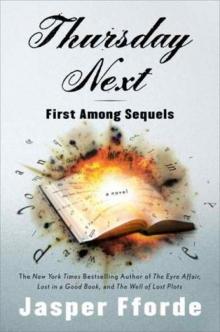 First Among Sequels
First Among Sequels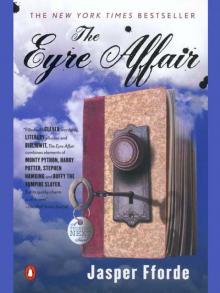 The Eyre Affair
The Eyre Affair The Eye of Zoltar
The Eye of Zoltar The Woman Who Died a Lot
The Woman Who Died a Lot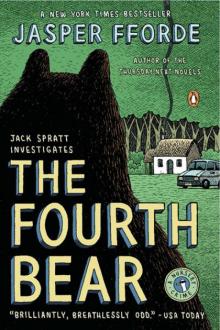 The Fourth Bear
The Fourth Bear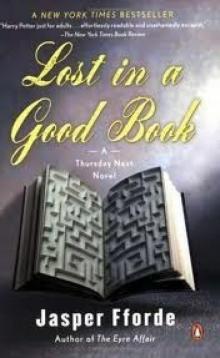 Lost in a Good Book
Lost in a Good Book Something Rotten
Something Rotten The Well of Lost Plots
The Well of Lost Plots The Big Over Easy
The Big Over Easy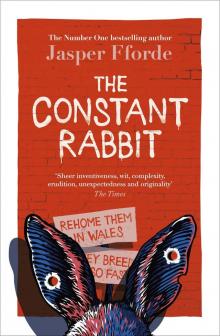 The Constant Rabbit
The Constant Rabbit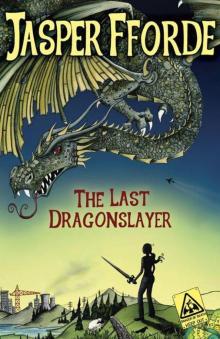 The Last Dragonslayer
The Last Dragonslayer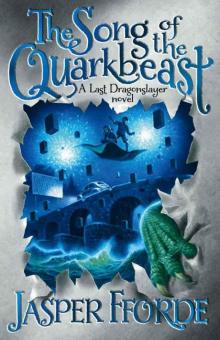 The Song of the Quarkbeast
The Song of the Quarkbeast One of Our Thursdays Is Missing
One of Our Thursdays Is Missing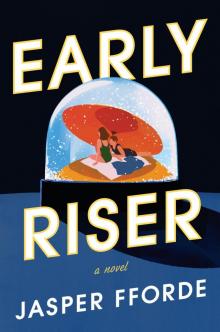 Early Riser
Early Riser Early Riser_The new standalone novel from the Number One bestselling author
Early Riser_The new standalone novel from the Number One bestselling author Something rotten n-4
Something rotten n-4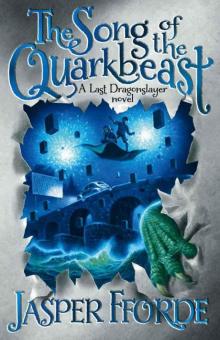 The Song of the Quarkbeast tld-2
The Song of the Quarkbeast tld-2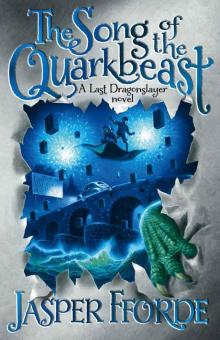 The Song of the Quarkbeast: Last Dragonslayer: Book Two
The Song of the Quarkbeast: Last Dragonslayer: Book Two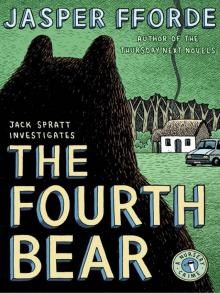 The Fourth Bear nc-2
The Fourth Bear nc-2 Lost in a Good Book tn-2
Lost in a Good Book tn-2 The Well of Lost Plots n-3
The Well of Lost Plots n-3 Thursday Next in First Among Sequels
Thursday Next in First Among Sequels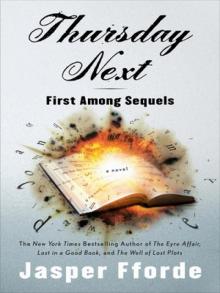 First Among Sequels tn-5
First Among Sequels tn-5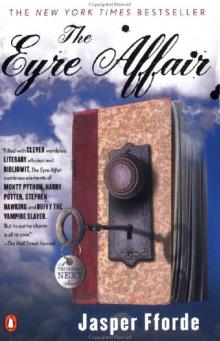 The Eyre Affair tn-1
The Eyre Affair tn-1